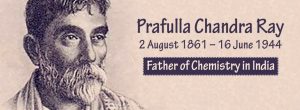
Acharya Prafulla Chandra Roy Biography
Born on August 2, 1861, and passing away on June 16, 1944, Sir Acharya Prafulla Chandra Ray was an extraordinary scientist, author, lecturer, industrialist, philanthropist, and much more.
Ray, who is regarded by many as “the father of Indian chemistry,” was a trailblazer and the leader of contemporary chemical research in India.

Wiki Profile
| Born | Prafulla Chandra Rayaa 2 August 1861 Paikgaccha, Upazila Khulna, Jashore Bengal, British India |
|---|---|
| Died | 16 June 1944 (aged 82) Calcutta, Bengal, British India |
| Nationality | British Indian |
| Alma mater | University of Calcutta (B.A.) University of Edinburgh (B.Sc., D.Sc.) |
| Awards | Order of the Indian Empire (CIE) Knight Bachelor Fellow of the Chemical Society (FCS) Foundation Fellow of the National Institute of Sciences of India (FNI) Fellow of the Indian Association for the Cultivation of Science (FIAS) |
Scientific career | |
| Fields | Inorganic chemistry Organic chemistry History of Chemistry |
| Institutions | Presidency College, Calcutta Calcutta University College of Science (also known as Rajabazar Science College) |
| Thesis | Copper-Magnesium Group Conjugated Sulphates: An Analysis of Isomorphous Combinations and Molecular Combinations (1887) |
| Doctoral advisor | Alexander Crum Brown |
| Notable students | Satyendranath Bose Meghnad Saha Jnanendra Nath Mukherjee Jnan Chandra Ghosh |
Signature | |
Early Life Family and Education
Ray was born in Raruli, Khulna District, which is now in Bangladesh. Ray did well in school from a young age.
He went on to finish his F.A. at the Metropolitan Institution (now Vidyasagar College) and enrolled as an external student at Presidency College (now University) to take his first chemistry courses with Professor Alexander Pedler.
He was captivated by chemistry right away and decided to pursue a career in it to make India a leader in scientific innovation.
He pursued his chemical studies at the University of Edinburgh under the auspices of the Gilchrist Prize Scholarship, where he eventually earned his B.Sc. and D.Sc.
Career
Although Ray has worked in many other fields of chemistry, his work on organic and inorganic nitrites has brought him the title of “Master of Nitrites.”
The discovery of the stable chemical mercurous nitrite in 1896, which set the stage for years of discoveries and published research on the synthesis, structure, and breakdown of nitrites and hyponitrites of various metals, is one of his most noteworthy achievements in this field.
Over 150 unique research articles in different areas of chemistry have been written by him.
Loved by his students and regarded as a visionary ahead of his time, Ray was a beloved professor who worked to elevate India to the forefront of scientific discovery and growth.
He saw the significance of combining ancient and modern science.
The old Indian saying, “Wish for victory everywhere except from your son and your disciple,” was something he adhered to.
Influence and Legacy
Prof. Ray’s influence continues to this day in countless contemporary research publications, even after his passing.
We have assembled a selection of ACS journal publications that expand upon Prof. Ray’s groundbreaking work and demonstrate his enduring impact in the domains of organic and inorganic chemistry, among others, in observance of his extraordinary legacy.
What was discovered by Prafulla Chandra Ray?
In the year 1895, he made the stable compound Mercurous Nitrite discovery. In 1919, the British Government bestowed upon him the knighthood after bestowing upon him the imperial title of Companion of the Indian Empire (CIE) initially.14
Who was Acharya Prafulla Chandra Roy in English?
Scientist and chemist Prafulla Chandra Ray was of Bengali descent. Because of his reliable discovery of mercury nitrite, he is regarded as the Father of Indian Chemistry. The birthdate of Indian chemist Prafulla Chandra Ray is August 2, 1861.
Who discovered mercurous nitrate?
Acharya Prafulla Chandra Roy’s discovery of the Mercurous Nitrite compound makes him a Master of Nitrites as well.

Discover more from Labaran Yau
Subscribe to get the latest posts sent to your email.


















